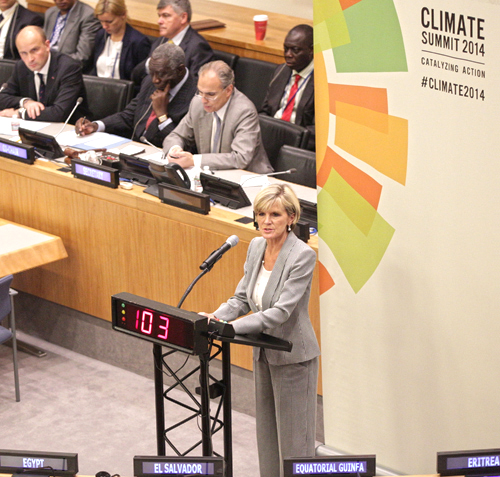With the world’s carbon emissions rising at an increasing rate, Tony Abbott chose to stay away from a UN leaders’ summit on climate. [30 September 2014 | Peter Boyer]

Australian foreign minister Julie Bishop addresses the UN climate summit. AUSTRALIAN GOVERNMENT PHOTO
A slew of reports this month on our response to climate change all carry the same clear message. If the world acts decisively and soon to rein in carbon emissions we can have a stronger economy and a habitable planet. If it doesn’t, we’re cooked on both counts.
The Global Commission on the Economy and Climate, formed by seven countries on four continents to analyse the economic issues around climate action, reported that a low-carbon “new climate economy” will be a far more productive one than what we have today.
Fossil fuel will ultimately ruin our economies, says the commission, but if we focus our spending over the next 15 years on renewable energy, better agriculture and more liveable cities, we’ll finish up with economies that work better for us and the planet.
Studies of the economies of Australia, the US and Europe strongly support the commission’s finding that reduced use of fossil fuels by means such as abandoning coal, oil and gas subsidies will ultimately deliver higher long-term economic benefit at a much lower cost.
The UN-sponsored Sustainable Development Solutions Network, based in New York, and the Paris-based Institute for Sustainable Development and International Relations have commissioned a long-term global investigation they call the “Deep Decarbonisation Pathways Project” (DDPP).
Last week’s DDPP report describes technologies and scheduling for a carbon-neutral global economy by 2050, ahead of a more comprehensive account of economic and social considerations to be released by June next year leading into the crucial UN climate summit in Paris.
The report points out that “to make a strong and convincing case for action at the national level, DDPs must be country-specific and developed by local experts”, which is why a report on Australian options for deep emissions cuts also came out last week.
The Australian study, by the non-profit ClimateWorks Australia and the Australian National University, used established modelling tools to identify feasible and least-cost options for attaining a carbon-neutral Australian economy by 2050. It found that Australia could achieve this and also maintain economic prosperity by making strategic transitions in electricity production and transport using currently-known technologies.
So it can be done, but will it? The Global Carbon Project, an international team of carbon-tracking scientists, released evidence this month that while we’re definitely moving, it’s in the wrong direction. Global emissions in the year to June 30 rose at a higher rate than in the previous year.
Three papers published in the science journals Nature Climate Change and Nature Geoscience, plus a fourth soon to be published by Earth System Science, say that to avoid dangerous warming the world must cut its emissions by over five per cent a year for several decades.
Professor Michael Raupach of ANU’s Fenner School in Canberra, who led the research, said that if global carbon emissions were shared equally between all people, Australia and other developed countries would have to cut emissions by over 15 per cent a year for several decades.
That level of reduction would go down like a lead balloon among developed countries, so the GCP approach is to find a “sweet spot in the middle”, acceptable to both rich and poor countries. One thing’s for sure: Australia’s current bipartisan target (five per cent by 2020) is grossly inadequate.
Corporate establishments locked into the fossil-fuel economy are driving government decision-making in many resource-rich countries, including Australia, where politics are fraught with fear of a resurgent renewable energy sector and a complete blindness to its huge possibilities.
Some political leaders go to the extreme of effectively denying the truth of what Raupach and virtually all climate scientists are saying about carbon emissions. Among them is our own Tony Abbott, who last week visited New York for a UN meeting on action against terrorism.
Had he arrived just a day earlier he could have joined 125 other world leaders in another UN meeting, the first leaders’ summit in five years on what UN Secretary-General Ban Ki-moon called “a defining issue of our age”, climate change.
But the prime minister chose instead to give a speech in parliament about terrorism. The sad fact is that while violence against people is something he feels he can handle, befitting a man of action, a forum on violence against nature is way out of his comfort zone.
The emissions evidence is yet another reminder from science that we’re on borrowed time. Yet both federal and state governments are treating climate change as if it’s a secondary issue, or no issue at all. The challenge for the rest of us is to compel them to sit up, take notice, and act.
• Climate Action Hobart’s response to the climate challenge is an afternoon workshop next Sunday on people power: what we can do about climate change which no government can stop. It starts at 1pm at the Phillip Smith Centre, Glebe. Information: climateactionhobart.org
